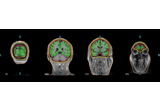mne.bem.make_flash_bem#
- mne.bem.make_flash_bem(subject, overwrite=False, show=True, subjects_dir=None, flash_path=None, copy=True, verbose=None)[source]#
Create 3-Layer BEM model from prepared flash MRI images.
- Parameters
- subject
str Subject name.
- overwritebool
Write over existing .surf files in bem folder.
- showbool
Show surfaces to visually inspect all three BEM surfaces (recommended).
- subjects_dirpath-like |
None The path to the directory containing the FreeSurfer subjects reconstructions. If
None, defaults to theSUBJECTS_DIRenvironment variable.- flash_path
str|None Path to the flash images. If None (default), mri/flash/parameter_maps within the subject reconstruction is used.
New in version 0.13.0.
- copybool
If True (default), use copies instead of symlinks for surfaces (if they do not already exist).
New in version 0.18.
Changed in version 1.1: Use copies instead of symlinks.
- verbosebool |
str|int|None Control verbosity of the logging output. If
None, use the default verbosity level. See the logging documentation andmne.verbose()for details. Should only be passed as a keyword argument.
- subject
See also
Notes
This program assumes that FreeSurfer is installed and sourced properly.
This function extracts the BEM surfaces (outer skull, inner skull, and outer skin) from multiecho FLASH MRI data with spin angles of 5 and 30 degrees, in mgz format.
